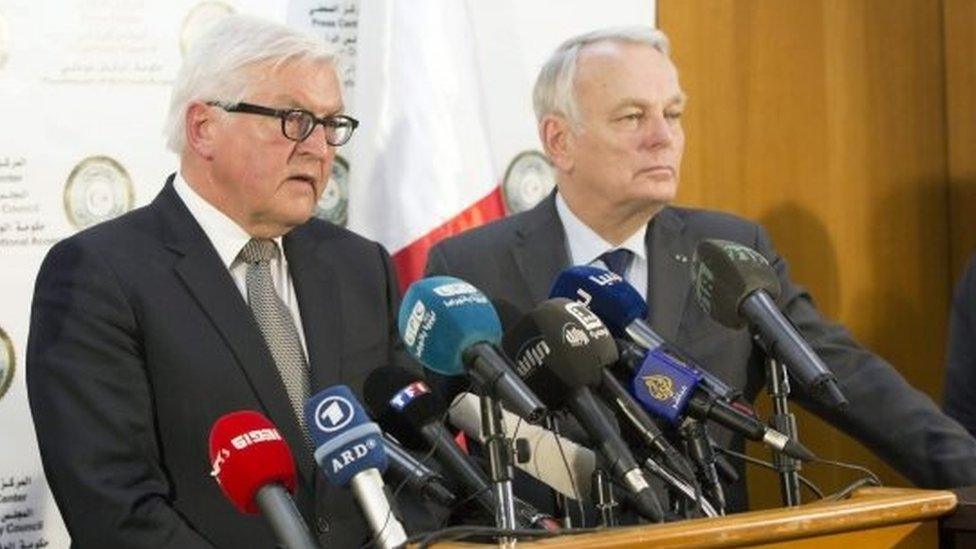Philip Hammond in Tripoli to support new Libyan government
- Published
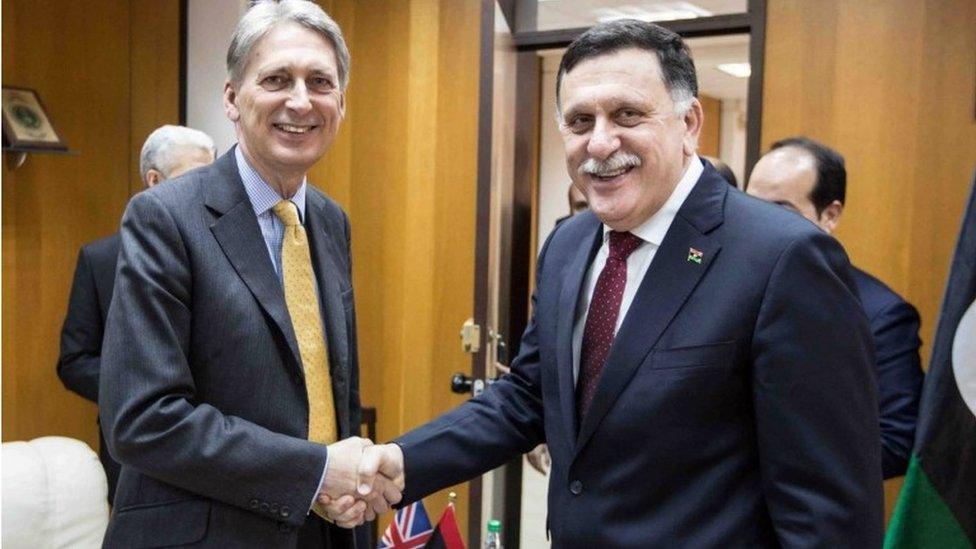
Foreign Secretary Philip Hammond has visited Libya in a show of support for the country's new UN-backed national unity government.
Mr Hammond met Prime Minister-designate Fayez Sarraj in Tripoli and pledged £10m in funding for the new government.
He also said the UK was ready to provide training support to the administration's armed forces.
Libya has been beset by chaos since Nato-backed forces overthrew ruler Col Muammar Gaddafi in October 2011.
The money pledged by the UK to the new Government of National Accord (GNA) includes £1.5m for tackling illegal migration, smuggling and organised crime, and £1.8m to support counter-terrorism activities.
Mr Hammond also discussed the administration's plans for rebuilding the economy and restoring public services, the Foreign Office said.
Peace and stability
Mr Hammond travelled to the heavily-protected naval base in the Libyan capital, Tripoli, where the administration is trying to establish its authority.
It is the first visit by a UK foreign secretary to Libya since 2011.
Mr Hammond's arrival follows similar visits over the past week by the Italian, French and German foreign ministers, while the British ambassador also returned to Tripoli for the first time since most foreign embassies pulled out in 2014 amid safety concerns.

Analysis
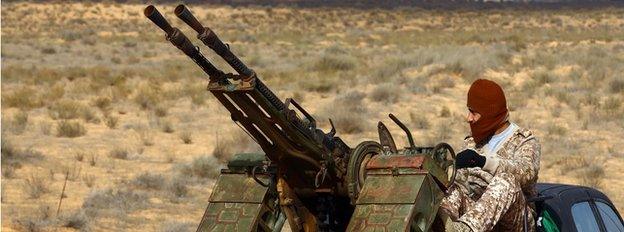
By Jeremy Bowen, BBC Middle East editor
Mr Hammond flew into Tripoli's smaller airport - the main one was destroyed by fighting between militias.
Britain and its Western allies are taking more interest in North Africa and Libya than at any time since the Arab uprisings of 2011. After Colonel Gaddafi was overthrown, they stepped back as the country descended into chaos.
Mr Hammond hopes national exhaustion will produce the will to co-operate that so far has been absent.
The weakness of the new government is that it depends on the consent of Libya's powerful militias. But this stabilisation plan is all there is.
If it doesn't work, Libyan people will still face danger and insecurity and so will their neighbours in Europe.

In 2011, the UK led international efforts, along with France, to back rebels fighting to overthrow Gaddafi.
The rebels succeeded but the country has since descended into chaos, with two rival governments and the formation of hundreds of militias, some allied to so-called Islamic State (IS).
Mr Hammond said he believed that after five years of fighting, there was now a weariness with conflict.
"What has happened since is a cathartic process.
"I sense that the Libyan people are ready for reconciliation and a government which allows them to work together," he said.
"Partly that is because they are simply tired of years of fighting each other and partly it is the galvanising effect of Daesh (IS)."
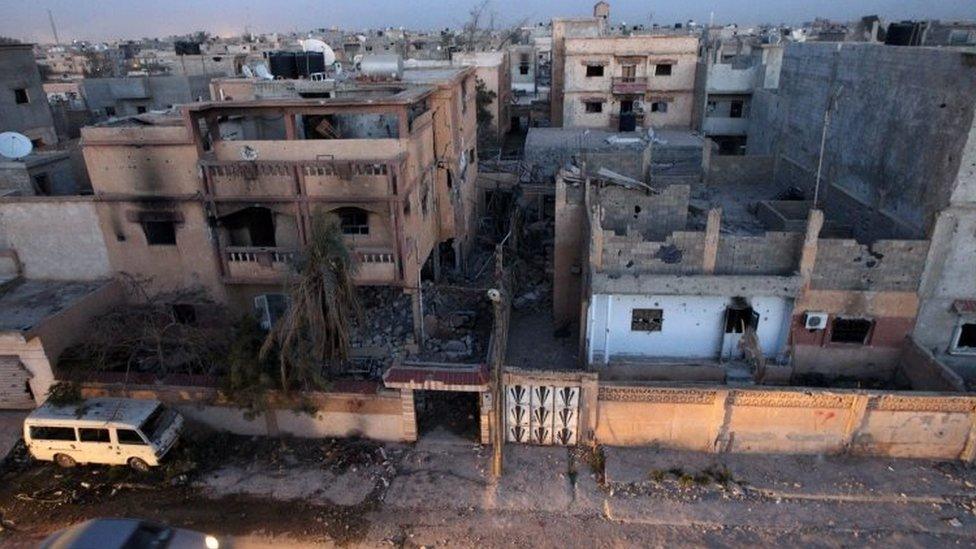
It is hoped the UN-backed national unity government will restore stability in war-ravaged Libya
Western nations hope the new government will take on IS, which has established a foothold in Sirte - the home town of Gaddafi.
The militant group has launched a series of suicide bombings and attacks on oil facilities in the country.
While Mr Hammond said he did not expect the GNA to ask for direct combat support to take on IS, Britain and other European allies were ready to provide training and other technical support to the Libyan forces.
"It must be for the Libyan people to decide how to recapture their country from the Daesh invaders," he said.
"I hope that as the militia groups come inside the tent, as it were, and cooperate with the government, it will be possible for us and our partners to support the military training programme."
He also made clear that such a mission - which could be based in another country in the region - would not require a Commons vote which was only needed for combat operations.
Combat role
His visit comes amid reports that Britain is considering sending up to 1,000 troops to Libya as part of an international assistance force.
But Defence Secretary Michael Fallon told the Commons that the government was "not contemplating" sending ground troops to the country.
"No such decision has been taken and we are not contemplating at the moment a commitment of that kind," he said.
"But what I can say to you is that if we are in the future to deploy military forces in a combat role into a conflict zone, we would of course, as the prime minister has made clear, come to this House first."
He said while the government will continue to inform Parliament of plans to commit UK troops in conflicts abroad, it will not enshrine that pledge in law.
Legally, the government does not need the permission of Parliament to use military force but there is a convention that it will consult MPs before doing so, where possible, and abide by the outcome of their vote.
Meanwhile, European countries are looking to Libya's government to allow the EU's Operation Sophia against people traffickers to extend its naval patrols into Libyan territorial waters.
- Published18 April 2016
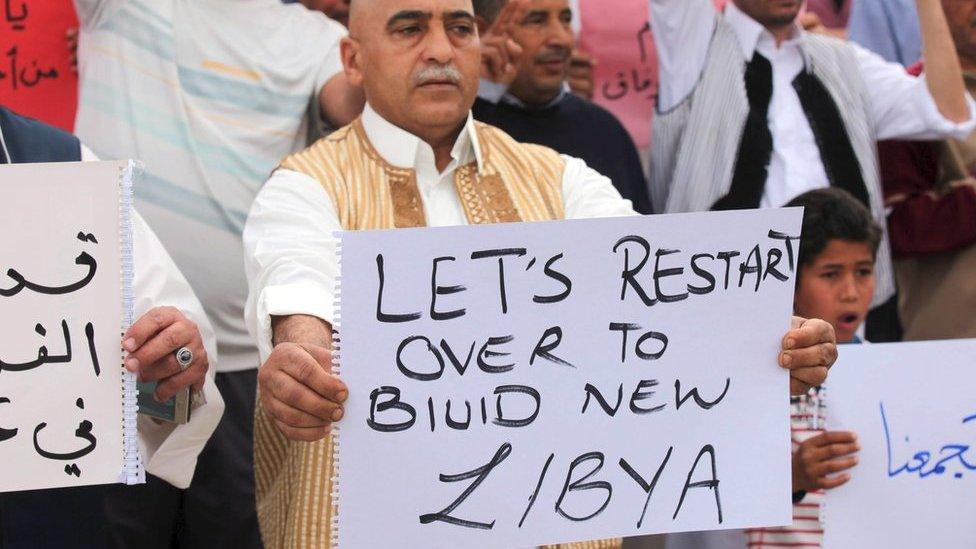
- Published16 April 2016
